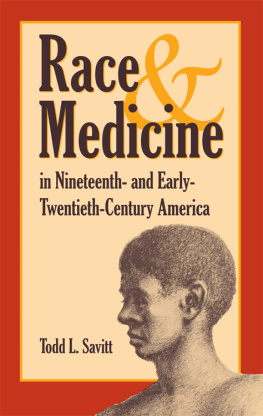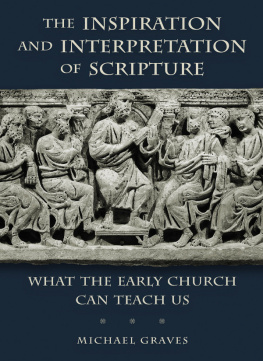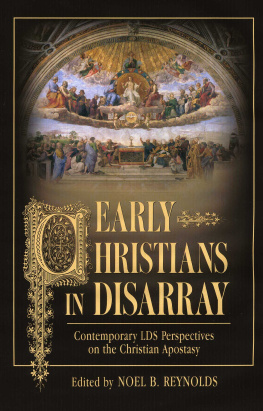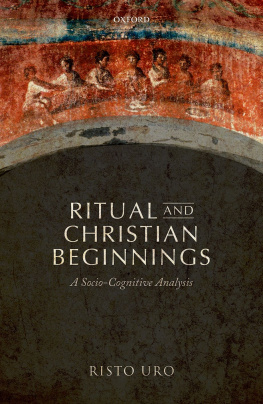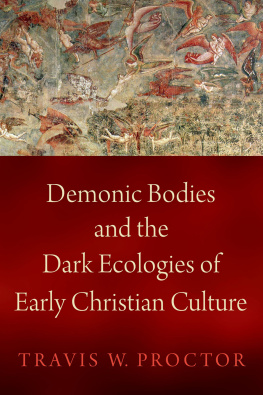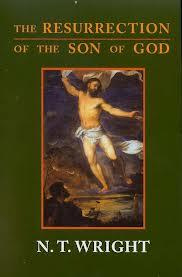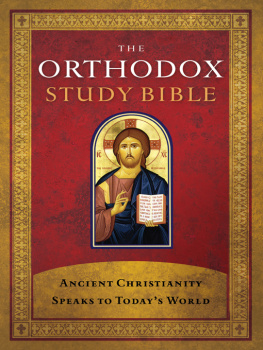Medicine & Health Care in Early Christianity
Medicine & Health Care in
Early Christianity
GARY B. FERNGREN

2009 The Johns Hopkins University Press
All rights reserved. Published 2009
Printed in the United States of America on acid-free paper
2 4 6 8 9 7 5 3 1
The Johns Hopkins University Press
2715 North Charles Street
Baltimore, Maryland 21218-4363
www.press.jhu.edu
Library of Congress Cataloging-in-Publication Data
Ferngren, Gary B.
Medicine and health care in early Christianity / Gary B. Ferngren.
p. ; cm.
Includes bibliographical references and index.
ISBN-13: 978-0-8018-9142-7 (hardcover: alk. paper)
ISBN-10: 0-8018-9142-6 (hardcover: alk. paper)
1. MedicineHistoryTo 1500. 2. MedicineReligious aspectsHistoryTo 1500. 3. Church historyPrimitive and early church, ca. 30600. I. Title.
[DNLM: 1. Christianityhistory. 2. Religion and Medicine. 3. Delivery of Health Carehistory. 4. History, Ancient. WZ 51 F364m 2009]
R145.F47 2009
610dc22 2008024674
A catalog record for this book is available from the British Library.
Special discounts are available for bulk purchases of this book. For more information, please contact Special Sales at 410-516-6936 or specialsales@press.jhu.edu.
The Johns Hopkins University Press uses environmentally friendly book materials, including recycled text paper that is composed of at least 30 percent post-consumer waste, whenever possible. All of our book papers are acid-free, and our jackets and covers are printed on paper with recycled content.
The purpose of medicine is to relieve suffering;
of religion to explain suffering or to help us accept it.
CONTENTS
ACKNOWLEDGMENTS
This volume addresses in a connected way the early Christian reception of Greek medicine and the origin and development of Christian medical philanthropy in the first five centuries of the Christian era. I began it while I held a resident fellowship at the Oregon State University Center for the Humanities. I continued my writing during a two-term sabbatical leave from Oregon State University and completed it with the support of Publication Grant No. 5G13 LM008687-02 from the National Library of Medicine. A Library Research Travel Grant from my universitys Valley Library allowed me to use the resources of several European libraries.
For most of my career I have collaborated with Darrel Amundsen. It was he who first introduced me to the social history of ancient medicine, and our collaboration of more than thirty years has been a fruitful and personally rewarding one. I had hoped that we would be able jointly to undertake this study, but circumstances have not made that collaboration possible. I dedicate this book to him as a token of our friendship and with gratitude for his influence and generous assistance over a lifetime. Portions of were coauthored by him when they appeared in an earlier form.
I am grateful to Darrel Amundsen and Vivian Nutton for the painstaking care with which they have read the manuscript and to the Reverend Martin Emmrich for reading the style and logic of the narrative. Kate Zahnle-Hostetler provided valuable assistance in the final stages of preparing the manuscript. Jacqueline Wehmueller, executive editor of the Johns Hopkins University Press, has been both encouraging and patient in granting me two extensions in the submission of the manuscript. My wife, Agnes Ferngren, was diagnosed with Stage IV cancer while the manuscript was in progress, and she passed away before it was finished. It is beyond my ability to express adequately my deep gratitude to her for her love, support, and encouragement during thirty-six years of marriage. Without it this book could not have been written.
Portions of several chapters originally appeared elsewhere. Several of my earlier published views have changed over time, and those changes are reflected in this book. I acknowledge permission to incorporate the following, in whole or in part, with many modifications and adaptations, into this volume:
Early Christianity as a Religion of Healing, BHM 66 (1992): 115. Reprinted with the permission of the Johns Hopkins University Press.
Early Christian Views of the Demonic Etiology of Disease, in From Athens to Jerusalem: Medicine in Hellenized Jewish Lore and in Early Christian Literature, edited by S. Kottek, M. Horstmanshoff, G. Baader, and G. Ferngren (Rotterdam: Erasmus, 2000), 183201. Reprinted with the permission of Erasmus Publishing Company.
The Early Christian Tradition (with Darrel Amundsen), in Caring and Curing: Health and Medicine in the Western Religious Traditions (New York: Macmillan, 1986; reprint, Baltimore: Johns Hopkins University Press, 1997), 4064. Reprinted in part with the permission of Advocate Lutheran General Hospital.
Philanthropy in Medicine: Some Historical Perspectives (with Darrel Amundsen), in Beneficence and Health Care, edited by E. E. Shelp (Dordrecht: Reidel, 1982), 131. Reprinted in part with the kind permission of Springer Science and Business Media.
The Imago Dei and the Sanctity of Life: The Origins of an Idea, in Euthanasia and the Newborn: Conflicts Regarding Saving Lives, edited by R. C. McMillan, H. T. Engelhardt Jr., and S. F. Spicker (Dordrecht: Reidel, 1987), 2345. Reprinted in part with the kind permission of Springer Science and Business Media.
The Organisation of the Care of the Sick in Early Christianity, in Actes/Proceedings of the XXX International Congress of the History of Medicine, edited by H. Schadewaldt and K.-H. Leven (Leverkusen: Vicom KG, 1991), 1928. Reprinted with the permission of the editors.
Lay Orders of Medical Attendants in the Early Byzantine Empire, in Acts/Proceedings of the XXXI International Congress of the History of Medicine, edited by R. A. Bernabeo (Bologna: Monduzzi Editore, 1988), 7939. Reprinted with the permission of Monduzzi Editore SPA.
The Early Christian Reception of Greek Medicine, in Beyond Reception: Mutual Influences between Antique Religion, Judaism, and Early Christianity, edited by David Brakke, Anders-Christian Jacobsen, and Jrg Ulrich (Frankfurt: Peter Lang, 2006), 15573. Reprinted in part with the permission of the editors and the publisher.
Krankheit, in Reallexikon fr Antike und Christentum, Band XXI, edited by Georg Schllgen et al. (Stuttgart: Anton Hiersemann, 2006), cols. 9661006. Translated and reprinted in part with the permission of Anton Hiersmann KG Verlag and the Franz Joseph Dlger-Institut der Universitt Bonn.
The scripture quotations contained herein are from the New Revised Standard Version Bible, copyright 1989, by the Division of Christian Education of the National Council of Churches of Christ in the U.S.A. They are used by permission. All rights are reserved.
I have not striven for consistency in citing the titles of ancient sources. Sometimes I use the Latin or Greek titles and sometimes (especially for well-known works) the common English translation (e.g., Augustine, City of God rather than De civitate Dei). For bibliographic data on texts and translations of the works of the church fathers that I cite or quote, see Johannes Quasten, Patrology, 4 vols. (195086), and Everett Ferguson, ed., Encyclopedia of Early Christianity (1990).
Medicine & Health Care in Early Christianity
CHAPTER ONE
Methods and Approaches
The intersection of medicine and the Bible, particularly in the Bibles passing references to illness and healing, has long fascinated medical professionals and lay readers alike. Many of the subjects that fall under the rubric of biblical disease and medicine have been repeatedly discussed. What was the nature of biblical leprosy and how did it differ from modern leprosy? Why was it associated with ritual cleanness? Does the Holiness Code establish rules for public health that reflect an early Hebrew understanding of hygiene? Did a native medical tradition exist in Israel? Was Pauls thorn in the flesh a chronic disease or physical disability and, if so, of what nature? How does one explain demonic possession and miraculous healing as they are described in the healing narratives of the Gospels? And how does the modern reader account for Jesuss healings? Were they displays of miraculous power or examples of faith healing or suggestion? Was Jesus, as some modern scholars argue, a Mediterranean folk healer who employed contemporary methods of healing similar to those practiced by other itinerant healers?
Next page

